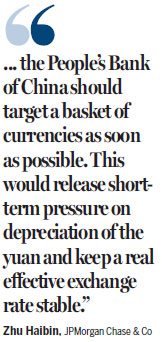Renminbi 'facing downward pressure'
Updated: 2015-09-17 07:44
By Emma Dai in Hong Kong(HK Edition)
|
|||||||
Economist rules out long-term depreciation, calls for yuan to be pegged to basket of currencies
Weaker growth on the mainland, coupled with the prospect of rising US interest rates, will drive the renminbi down in the short term, but a long-term depreciation is unlikely, according to a JPMorgan economist.
Zhu Haibin, chief China economist at JPMorgan Chase & Co, also suggested that the renminbi be pegged to a basket of currencies to relieve depreciation pressure.
"The PBOC (People's Bank of China) probably has missed the best time window (for free-floating of the renminbi). At least, the chance of success was much higher in August. Now, the expectation of depreciation is much stronger," he said on Wednesday.
"It's irrational to expect the renminbi to depreciate by as much as 20 percent to 7.8 yuan per US dollar, which is totally contradictory to the pre-Aug 11 market consensus of a range of between 6.4 to 6.5 yuan per US dollar," Zhu said. "However, a new consensus is hard to reach. Many are looking at around 6.6 to 6.7 yuan per US dollar, whereas others hold a far more bearish view."

In a surprise move on Aug 11, the PBOC - the central bank - lowered the renminbi fixing rate by 1.86 percent - the sharpest daily decline in two decades.
Against the backdrop of weaker economic data on the mainland and the expectation of a US interest-rate hike later this year, the depreciation sparked fierce reaction from financial circles. At the peak, the yuan depreciated to 6.5 against the greenback in the offshore market.
The daily fixing rate and offshore renminbi stood at 6.37 yuan and 6.4 yuan per US dollar, respectively, on Wednesday.
Norman Chan Tak-lam, chief executive of the Hong Kong Monetary Authority - the city's de facto central bank - reassured on Wednesday that the shrinking renminbi pool will not shake the local banking system. "We don't expect the renminbi to depreciate in the long run although the US dollar is strengthening. As the currency remains stable, offshore demand for yuan will recover," Chan said.
UBS economist Wang Tao predicted in a report published on Sept 4 the central government will use foreign exchange reserves and tighter foreign exchange controls to fight against capital outflow and help preserve the renminbi's "relative stability" in the coming year. She expected the central government to keep its currency traded at or below 6.5 yuan per US dollar by yearend, and allow a modest 3-5 percent move in 2016 toward 6.8 at yearend.
However, Zhu pointed out that intervention is expensive. He estimated that in August alone, the PBOC had spent about $100 billion in the foreign exchange market to rescue the yuan.
"The monetary policy divergence between the Chinese mainland and the US is clear. Instead of aiming at yuan stability against the US dollar, the PBOC should target a basket of currencies as soon as possible. This would release short-term pressure on depreciation of the yuan and keep the real effective exchange rate stable," he said.
emmadai@chinadailyhk.com
(HK Edition 09/17/2015 page8)